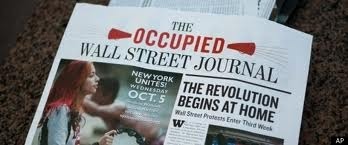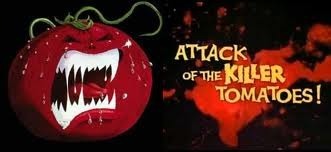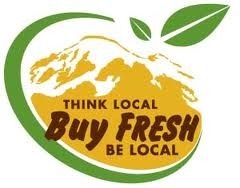Alon Shalev's Blog, page 58
October 8, 2011
Author's Corner: The Creative Period
I was recently asked in a workshop how I find time to write. I had just surprised the audience when I asserted that I can write a 90,000 novel in 100 days. I have done this twice this year and would keep writing if I didn't have to attend to marketing and promotion. All this while holding down a challenging full-time job and being an active and involved husband, father and community member.
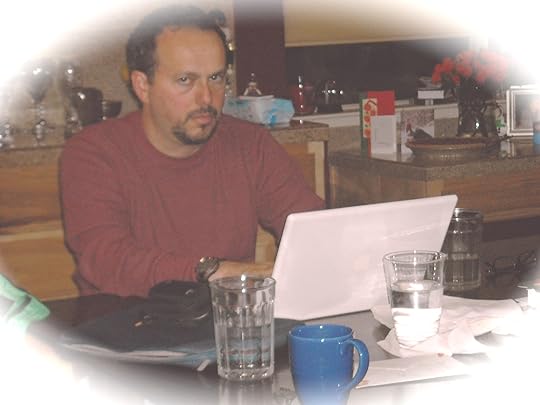
Finding a couple of hours on a road trip
Many authors have their own personal framework: the sacred space in the house, listening to music, the writer's retreat, and many more. Whatever works for you is right, but my desk in our kitchen. I swivel my chair around and I am at the dinner table. I can write in coffee shops, on the BART train ride as I commute, while several boys enjoy a rumbuncious play-date in our tiny house.
It is a state of mind. When I am writing a novel, I am in an intimate relationship with my characters. Given that I do not plan my novels, I am absorbed in the plot, sharing the thrill of what might happen next, just as my readers and characters do.
I am able to switch off, to leave my characters while I focus at work or home, and switch back on when I have an hour to write. What I do think is important is that I am writing consistently. When I am in the creation process, I must write every day. In fact, I suspect that I can become quite insufferable when I am not keeping up with my characters.

Writing our 1st Fantasy novel on a camping trip - a team effort!
Still it is an amazing thrill, a rush, to see the novel taking shape under my fingertips. It is what makes the periods between writing so frustrating, and what keeps me coming back for more.
——————————————————————————————————
Alon Shalev is the author of The Accidental Activist (now available on Kindle) and A Gardener's Tale. He is the Executive Director of the San Francisco Hillel Foundation, a non-profit that provides spiritual and social justice opportunities to Jewish students in the Bay Area. More on Alon Shalev at http://www.alonshalev.com/and on Twitter (#alonshalevsf).








October 7, 2011
Millennials – We are missing the point
The Pew Research Center has recently released a study comparing about the millennials. Since I work with college students I am particularly interested, though not surprised at the results.
Forty years ago, as the college campuses erupted in protests to the wars in Vietnam and Cambodia, students held sit-ins, threw stones at police and when the National Guard opened fire at Kent State, killing four students, and the entire college system was galvanized and ground to a halt.
It is hard to imagine anything galvanizing students today and the Pew study highlights how this generation, instead of rebelling against their parents actually embrace their values. An earlier study asked the students to list their three heroes. Most included at least one of their parents.
Forty years ago, 74% of students responded to a Gallup poll agreeing that their parents' generation was corrupt and that they felt alienated from their values. Today's college students are Facebook friends with their parents and text them on average 10x a week. They shop together because they wear the same clothes, listen to the same music, and the millennials credit their parents as having superior values to their own generation.

Parents and children still tied together virtually
This, and similar studies, has led to considerable criticism of the millennials: that they lack values and motivation, that they embrace an air of entitlement, that they are more concerned with the latest cell phone than the headlines of a newspaper.
There are two mistakes here. Firstly, if we are going to compare between the two generations, we would have to admit that this generation has better education, opinions that are more diverse and have an inherent belief in the system. But it is the advancement of technology and social media that is shaping this generation and it is making comparisons with past generations almost impossible.
But there is a second point that we are missing. While it is easy to berate the millennials while idealizing their parents' radicalization at their age, we forget to give credit to this generation's parents. These are the people who, through honest and committed parenting, have engendered the close bonds with their children. By listening to their music and watching their TV programs, this generation of parents are informed about their children as no other generation ever was.
These parents are deeply committed to being a part of their children's' lives without offering value judgments that would push their children away. By embracing their children and joining them on their own turf (Facebook, Twitter, texting), they are engendering a sense of intergenerational acceptance that is unique and deserves credit.
Perhaps it was something that evolved during those college protests forty years ago, but today we are so focused on the millennials, we forget that their parents are still out there holding their values up for the whole world to see.
When I meet the parents of my students and see their mutual love, commitment and comfort, it inspires me to be a better parent to my children because I see the bond between them as a cause worth fighting for.
——————————————————————————————————
Alon Shalev is the author of The Accidental Activist (now available on Kindle) and A Gardener's Tale. He is the Executive Director of the San Francisco Hillel Foundation, a non-profit that provides spiritual and social justice opportunities to Jewish students in the Bay Area. More on Alon Shalev at http://www.alonshalev.com/and on Twitter (#alonshalevsf).








October 6, 2011
Declaration of Change
Too many Americans are suffering. Our unalienable rights – the right to Life, Liberty and the pursuit of Happiness – whether given by the God of Creation or by Natural Law, are being violated. The self-evident truth that all REAL people are created equal is not recognized by the forces now governing us.
Our representative form of democracy – government of, by and for real people – has been corrupted. An insidious and deception process has transformed a government from one that once placed importance on real people to one that now favors artificial persons (corporations). Consequently, legislative reforms and laws, over the past 30 years, have benefited big business and the wealthiest Americans while burdening the middle-class and poor.
When any form of government becomes destructive to the safety and happiness of its real people, it is the RIGHT of the people and it is their duty to change or abolish the current form and implement a new government that effects and guards their future security.
Americans are suffering, suffering from the financial burdens placed on them as a result of tax rate changes, trade agreements and uncontrolled multi-national globalization. Long-standing corporate responsibility has eroded. Campaign contribution from big business, their PACs and lobbyists influenced politicians to make favorable financial legislation for corporations. The government represents the tyrant-will of artificial persons and the wealthy. It is now unfit to govern free people.
The people have been abused to the point of action. The winds of change are blowing and it's time to support it. Occupy Wall Street is just one of many battles to come. This blog posting, which borrows key words and phrases from the Declaration of Independence, is my initial show of support for the brave individuals that are sleeping and protesting in the parks and avenues of New York.
It's time to act. It's our right and our duty to cast off tyranny.
-Roger Ingalls
—————————
Roger Ingalls is well traveled and has seen the good and bad of many foreign governments. He hopes his blogging will encourage readers to think more deeply about the American political system and its impact on US citizens and the international community.








October 5, 2011
Troy Davis – Revisiting the Death Penalty
Troy Davis was arrested and convicted of murder of police officer Mark MacPhail in Savannah, Georgia, on August 19, 1989. Officer MacPhail was working as a Burger King security guard and intervened to defend a man being assaulted in a nearby parking lot. Two weeks ago, Davis was executed for his crime.

Mark MacPhail
Davis maintained that he was innocent from the very beginning and several witnesses recanted their testimony and the murder weapon was never found. A fuller account of the trial can be found here but what is clear is that there was a full process and many opportunities along the way for the death sentence to be commuted. But it wasn't. Here is another account of the trial from a perspective that Davis was indeed guilty.
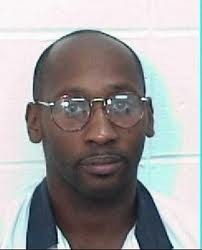
Troy Davis
I am surprised to find that, among my largely liberal friends, the jury is also out about the death penalty. The few people I know who have someone close to them been a victim of violent crime seem to favor keeping it. The further right we go, the more we are reminded that it costs millions of dollars to keep someone alive on death row and they get better medical and dental help than our war veterans.
One of the most powerful experiences that I had during my annual trips with students to help rebuild the Gulf Coast was a meeting with two men who sat on death row for 20+ years and were exonerated. They have a long list of men who were executed who's guilt was in question and for whom the advances of DNA technology might also have proved their innocence. There is an organization called the Innocence Project that I wrote about a few months ago, who work with exonerees.
It seems that when a person takes another life and admits to the crime that the death penalty has its place, but when there is doubt, I fail to understand how we continue to take the person's life.
Your views?
——————————————————————————————————
Alon Shalev is the author of The Accidental Activist (now available on Kindle) and A Gardener's Tale. He is the Executive Director of the San Francisco Hillel Foundation, a non-profit that provides spiritual and social justice opportunities to Jewish students in the Bay Area. More on Alon Shalev at http://www.alonshalev.com/and on Twitter (#alonshalevsf).








October 4, 2011
Obama Must Lose – Part II – Tom Rossi
After last week's post, Obama Must Lose… to a Progressive, some friends asked questions that made me realize that I need to make my strategy a little more clear.
As with any presidential election, the Republicans' main goal is to create apathy and lethargy among Democratic voters so that they stay home and don't bother to vote. If this happens, the Democrats will lose – and accomplish nothing in the process. This is why we need huge numbers of Progressive voters to hit the polls – and vote for Dennis Kucinich. And if Kucinich is not on the ballot, write in his name. That way, it will be clear just WHY Obama loses: he abandoned his base.
Now I truly believe that Barrack Obama is a very good man. But it's clear that he has been seduced and coopted by the dominant economic paradigm of our time. The economic con-men that have created this domination can be very convincing. They talk in country-like aphorisms and say brilliant things like, "Don't buy a pig in a polk." Who could argue with that?
President Obama is an intelligent and educated man, but his education has been halted by the blaring sirens of economic darwinism. The same was true of Bill Clinton – by many arguments a more conservative president than Ronald Reagan.
There are three general outcomes possible in the 2012 presidential election. The first possibility is that Obama wins a second term, which will mean that our country continues along the scenic route toward hell. The second is that disenchanted Democrats stay home and Obama loses to a Republican – our journey toward hell is slightly accelerated, followed by another swing of the pendulum four years later to put us back on the scenic route.
The third possibility, the one I am advocating, is that Obama loses because Democrats and non-Democrat Progressives showed up at the polls and took the presidency away by voting for Kucinich. This way, when the pendulum swings back (and it will, as unemployment will be even worse and millions more will have been foreclosed upon), it will swing HARD.
Finally, Progressives will have a voice in national politics. Finally, the "flavors" of capitalism will be open for discussion. Capitalism should not be abandoned, but the flavor we have now tastes like liver – rotten liver.
So, if you can see my logic, don't try to convince Obama supporters not to vote for him but convince the disenchanted – those who would stay home – that they need to get out and vote in 2012. They need to get out and make their vote count. Vote "People Before Profits!" Make our voices heard.
-Tom Rossi
___________________________________________________________________________
Tom Rossi is a commentator on politics and social issues. He is a Ph.D. student in International Sustainable Development, concentrating in natural resource and economic policy. Tom greatly enjoys a hearty debate, especially over a hearty pint of Guinness.
Tom also posts on thrustblog.blogspot.com
___________________________________________________________________________








Obama Must Lose – Part II
After last week's post, Obama Must Lose… to a Progressive, some friends asked questions that made me realize that I need to make my strategy a little more clear.
As with any presidential election, the Republicans' main goal is to create apathy and lethargy among Democratic voters so that they stay home and don't bother to vote. If this happens, the Democrats will lose – and accomplish nothing in the process. This is why we need huge numbers of Progressive voters to hit the polls – and vote for Dennis Kucinich. And if Kucinich is not on the ballot, write in his name. That way, it will be clear just WHY Obama loses: he abandoned his base.
Now I truly believe that Barrack Obama is a very good man. But it's clear that he has been seduced and coopted by the dominant economic paradigm of our time. The economic con-men that have created this domination can be very convincing. They talk in country-like aphorisms and say brilliant things like, "Don't buy a pig in a polk." Who could argue with that?
President Obama is an intelligent and educated man, but his education has been halted by the blaring sirens of economic darwinism. The same was true of Bill Clinton – by many arguments a more conservative president than Ronald Reagan.
There are three general outcomes possible in the 2012 presidential election. The first possibility is that Obama wins a second term, which will mean that our country continues along the scenic route toward hell. The second is that disenchanted Democrats stay home and Obama loses to a Republican – our journey toward hell is slightly accelerated, followed by another swing of the pendulum four years later to put us back on the scenic route.
The third possibility, the one I am advocating, is that Obama loses because Democrats and non-Democrat Progressives showed up at the polls and took the presidency away by voting for Kucinich. This way, when the pendulum swings back (and it will, as unemployment will be even worse and millions more will have been foreclosed upon), it will swing HARD.
Finally, Progressives will have a voice in national politics. Finally, the "flavors" of capitalism will be open for discussion. Capitalism should not be abandoned, but the flavor we have now tastes like liver – rotten liver.
So, if you can see my logic, don't try to convince Obama supporters not to vote for him but convince the disenchanted – those who would stay home – that they need to get out and vote in 2012. They need to get out and make their vote count. Vote "People Before Profits!" Make our voices heard.
-Tom Rossi
___________________________________________________________________________
Tom Rossi is a commentator on politics and social issues. He is a Ph.D. student in International Sustainable Development, concentrating in natural resource and economic policy. Tom greatly enjoys a hearty debate, especially over a hearty pint of Guinness.
Tom also posts on thrustblog.blogspot.com
___________________________________________________________________________








October 3, 2011
15 Minutes A Day
It was a rare weekday opportunity that I was able to walk my eight-year-old to school. As we approached the entrance, he got very excited and pulled me over to a table. "You've gotta sign up," he declared and I immediately wished his mother had taken him to school.
"Do you have 15 minutes a day for your son?" a woman asked, far too chirpy for pre-1st cup of joe.
I was about to respond that I never have enough time for him (martyr, martyr, martyr) when I read … Did you know that spending just 15 minutes with your child 2-3 times a week can make a world of difference?
And then I made my biggest mistake – I looked down at my son's expectant face. He is dying to spend 15 minutes a day with me one-on-one, especially because he gets a free ice cream at the end of each month.

Proud father moment - our first serious bike trip at Lake Siskiyou this summer
Okay, enough of the cynicism. I'm very proud of the Berkeley Unified School District. I'm very proud that the good taxpayers of Berkeley sign off every year not to cut funding to education, and most of all, I'm very proud of our incredibly committed teachers.
And hey, if theses teachers can spend several hours a day with my kids, then I can find 15 minutes, no? What is interesting about this is that the child decides how that time is spent and they make the rules.
What does this do? Studies show that spending regular quality time with your child will give them: higher self-esteem, desire to cooperate, compassion for others, and a better focus for learning.
It might seem a little strange that we need to make a campaign out of something so basic. After all, as a parent, you would think that most of us actually wanted the little buggers in the first place. But the reality in such an intense 21st century lifestyle is that we fail to do this. For my part, I usually offer to spend time with my youngest by offering a specific activity – soccer in the car park, reading on my bed etc. Even when it comes to TV, I realize that there is a menu attached with a couple of his programs that I don't go crazy watching.
So maybe we can create a better world by teaching the next generation the values that our generation failed to understand. And if 15 minutes a day is what will do it, I pledge.

A day earlier this year in the snow.
Finally, a shout out to the San Francisco Foundation and the Witkin Foundation for sponsoring this initiative.
"15 minutes, because kids spell "love" … T-I-M-E.
——————————————————————————————————
Alon Shalev is the author of The Accidental Activist (now available on Kindle) and A Gardener's Tale. He is the Executive Director of the San Francisco Hillel Foundation, a non-profit that provides spiritual and social justice opportunities to Jewish students in the Bay Area. More on Alon Shalev at http://www.alonshalev.com/and on Twitter (#alonshalevsf).
October 1, 2011
Author Update and Question
The beginning of the month is a good time for a progress report: what is working and what needs tweaking. It is an exciting period of time coming up.
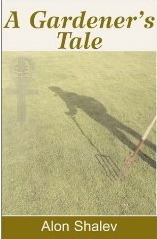
Will be re-released as an ebook in October
A Gardener's Tale has been professionally edited and, like a middle aged, overweight individual who has let things go in the last decade (no analogies please), is returning leaner and tighter. The novel has lost weight, some 7,000 words in fact, but still retains the plot and characters. A Gardener's Tale will be released later this month as an ebook, in time for…
The Virtual Book Tour kicks off in November. There are eighteen stops along the way with interviews, guest appearances, and reviews being organized under the professional auspices of Premier Virtual Author Book Tours. This is a whole new territory for me and I am excited to see how it goes. My publisher, Three Clover Press, has three authors doing this over the next few months, so it will be a fascinating to see the comparison. One interesting facet in the obvious comparison to traditional book tours is the fact that these appearances will stay on the Internet. I will learn more about this in the next week and keep you posted.
Unwanted Heroes has been submitted to the publisher and will be released in the new year. Now it is time to focus on book covers and the promotional release. Since I envisage Unwanted Heroes as the first in a series of books revolving around many of the same characters and staying in San Francisco, I am becoming excited at the idea of introducing you to the main characters. They are going to be around for a few years and hopefully you will become good friends.
I wrote back in August about John Locke who became the first independent author to sell one million ebooks. I just read his latest book in which he analyses his success. One of the key components of his strategy is to clearly define who his target audience is.
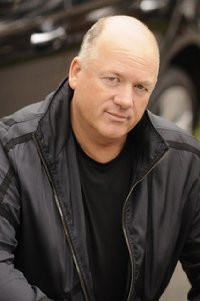
John Locke - 1 million ebooks sold.
This has me thinking. Who are the people reading my social justice novels? I would like to create a clear profile of 'my readers.' Could you help me with this? Please leave a character profile of yourself or someone who you would recommend my books to. What are your or your friends' attributes and demographics? When you imagine someone sitting in a coffee shop reading The Accidental Activist or Unwanted Heroes, how would you describe them?
You didn't expect homework did you? Still, there is only a pass grade and a very grateful author marking your work.
Seriously though, thank you for all your help and support.
——————————————————————————————————
Alon Shalev is the author of The Accidental Activist (now available on Kindle) and A Gardener's Tale. He is the Executive Director of the San Francisco Hillel Foundation, a non-profit that provides spiritual and social justice opportunities to Jewish students in the Bay Area. More on Alon Shalev at http://www.alonshalev.com/and on Twitter (#alonshalevsf).
September 30, 2011
Steve Jobs 2
Following on from last Friday's post, I have been wondering how much a company can really be sustainable if it leans so heavily on its CEO. The way some people talked about Steve Jobs stepping down at Apple had me worried that my iPod and MacBook would self destruct in five seconds.
But there are certain companies where the CEO seems to take on legendary proportions. Apple is of them, but there is also Walmart, Microsoft and most recently Starbucks. Howard Shultz wrote the book on building a company based on values and a dynamic business model. He literally wrote the book – Pour Your Heart Into It.
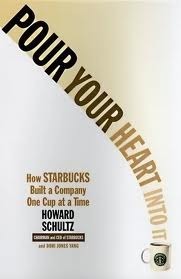
A Great Read.
When Howard Shultz left Starbucks the company experienced its first downfall. I'm not sure this is attributed to his departure, it is hard to spend $4 on a cup of coffee when you lose your job and your house is foreclosed, but tellingly, Shultz was lured back and Starbucks repositioned. I am sure this is all recorded in the uber-CEO's latest book, Onward, and I will review it soon as it rises up to the top of my To Read book pile.
I wonder if it shouldn't be a benchmark of a good CEO that s/he brings through a line of highly trained personnel from which one could be groomed as a successor? Was it a failure of Howard Shultz that he had to make a comeback? I wonder whether the mood within Apple was as preoccupied as it was played out in the media.
And this brings me to another top-heavy organization – the government. At the risk of endangering my desire to become a US citizen, I wonder whether there isn't too much emphasis on the President for governance and policy. Shouldn't there be a bigger emphasis and accountability on those who sit on the House and Senate to fix our problems and lead us forward?
Perhaps we learn from the successful company models in restructuring our governments.
——————————————————————————————————
Alon Shalev is the author of The Accidental Activist (now available on Kindle) and A Gardener's Tale. He is the Executive Director of the San Francisco Hillel Foundation, a non-profit that provides spiritual and social justice opportunities to Jewish students in the Bay Area. More on Alon Shalev at http://www.alonshalev.com/and on Twitter (#alonshalevsf).








September 29, 2011
Killer Cantaloupe
When will we learn that a centralized food system not only is environmentally disastrous but it also kills people? I blogged about an E. coli breakout in June, poisonous strawberry production earlier this month and now in late September, I'm writing about an outbreak of killer cantaloupe.
Killer Cantaloupe…it sounds like a bad title for a 1950's era B-horror movie. Unfortunately, this Listeria-laced deadly fruit is scary and real. To date, up to 16 people have died and close to 100 are seriously ill. The incubation period for Listeria can take as long as 70 days so it is forecasted that many more people will become sick and potentially die. So far, 18 states are affected by the cantaloupe that came from one farm in Colorado.
It's amazing that we continue to endorse a food system where one farm can make so many people sick across the country. We have choices. We can buy food from locally grown sources.
Let's briefly review the benefits of local food:
1) It is healthier because it tends to be organic and free of fuel-based fertilizers and pesticide.
2) It is harvested when rip and sold within 24 hours so it's more flavorful and has more nutrients. Factory farmed produce is picked weeks in advance and then ripened with ethylene gas before being sold.
3) Locally grown food (as with all locally manufactured products) employs more people and improves local economies.
4) It is environmentally friendlier than factory produced food. Factory farms are energy intensive, use chemicals and goods are transported up to 1500 miles creating a large carbon footprint. The run-off from factory farms acidifies waterways and negatively impacts the eco-system. In addition, these big farms inefficiently use water and create soil erosion.
I sound like a broken record because this subject comes up a lot in my posts. But it is important, especially now that the frequency of food borne illness is increasing. This doesn't need to happen. We have choices and all we need to do is think before we buy.
Save your life, your family, the planet and neighborhood jobs by buying locally produced goods.
-Roger Ingalls
————————————————–
Roger Ingalls is well traveled and has seen the good and bad of many foreign governments. He hopes his blogging will encourage readers to think more deeply about the American political system and its impact on US citizens and the international community.










